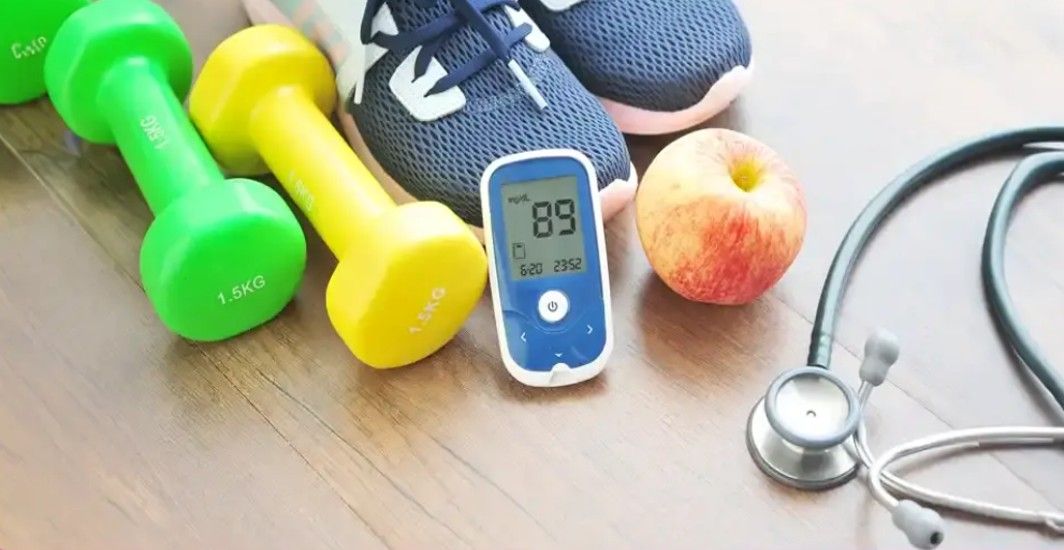Diabetes Management
An Apple a Day: A Nutritional Approach to Diabetes Care
2 min read
By Apollo 24|7, Published on - 14 August 2024
Share this article
0
0 like
.jpg?tr=q-80)
Can consuming apples support diabetes management? The answer is, indeed, affirmative! Not only are apples delicious, they come packed with an array of nutrients that can have positive effects on blood sugar control. However, as with any other food, it's essential to know the best ways to incorporate them into your diet and what makes them a great choice for individuals managing diabetes.
Understanding the Nutritional Profile of an Apple
- Fibre-Rich: With 4 grams of dietary fiber in a medium-sized apple, this fruit can aid in slowing the digestion and absorption of sugars, thus preventing sudden spikes in blood sugar levels.
- Low Glycaemic Index (GI): With a GI of 39, apples cause minimal impact on blood sugar levels compared to foods with a high GI.
- Fructose as Sugar: The primary sugar in apples is fructose which causes less of a blood sugar spike compared to glucose or sucrose, making apples a favorable choice.
- Antioxidant Powerhouse: Apples boast of antioxidants like quercetin that may improve insulin sensitivity and reduce the risk of type 2 diabetes. These compounds also help stabilize blood sugar levels.
Making Healthy Apple Choices
- Choose Whole Apples: Stick to whole apples over apple juice or processed apple products to retain the fiber and nutrients without added sugars.
- Pair it Up: Eating apples with a source of protein or healthy fats can help control blood sugar spikes and enhance satisfaction.
- Watch Portion Size: Opt for small apples or half of a larger one to manage carbohydrate intake and blood sugar levels.
- Don't Peel Off the Benefits: The skin of the apple is rich in fibre and antioxidants so eat it unpeeled for maximum benefits.
Evidently, incorporating apples into a diabetes-friendly diet can offer several health benefits, including improved blood sugar control. However, remember to monitor portion size and observe individual responses to fruit consumption. Including a variety of fresh fruits and vegetables in your diet, along with being mindful of carbohydrate intake, can help manage diabetes effectively.
Furthermore, enrolling in program like the Apollo Super 6 can provide additional support in managing diabetes through improved diet, increased physical activity and personalised guidance.
Diabetes Management
Consult Top Diabetologists
View AllLeave Comment
Recommended for you

Diabetes Management
Steps To Take In Case Of An Insulin Overdose
Insulin overdose can cause low blood sugar levels or hypoglycaemia, which can be dangerous if not managed promptly. Recognising the symptoms early, taking immediate action like consuming simple sugars, and seeking medical attention when necessary are vital steps. Proper management of insulin dosages and regular monitoring can help avoid such situations. Remember, when in doubt, always consult your doctor.

Diabetes Management
Genetic Testing May Help Determine the Cause for Type 1 Diabetes
Type 1 diabetes is an autoimmune disorder where the immune system attacks and destroys insulin-producing beta cells in the pancreas. A recent study suggests a specific dysfunction in exocrine cells of the pancreas may play a role in the development of type 1 diabetes. This finding expands our understanding of the disease and could potentially lead to new treatment approaches.

Diabetes Management
How Effective Are Diabetes Reversal Programmes?
Diabetes reversal is now seen as achievable through significant lifestyle changes and weight loss. The key lies in initiating the change at the right time and maintaining it. Consider enrolling in comprehensive programmes like Apollo Super6 to help manage your diabetes better. It's never too late to start your journey towards a healthier lifestyle.
Subscribe
Sign up for our free Health Library Daily Newsletter
Get doctor-approved health tips, news, and more.
Visual Stories

8 Fruits That are Incredibly Healthy for Diabetes
Tap to continue exploring
Recommended for you

Diabetes Management
Steps To Take In Case Of An Insulin Overdose
Insulin overdose can cause low blood sugar levels or hypoglycaemia, which can be dangerous if not managed promptly. Recognising the symptoms early, taking immediate action like consuming simple sugars, and seeking medical attention when necessary are vital steps. Proper management of insulin dosages and regular monitoring can help avoid such situations. Remember, when in doubt, always consult your doctor.

Diabetes Management
Genetic Testing May Help Determine the Cause for Type 1 Diabetes
Type 1 diabetes is an autoimmune disorder where the immune system attacks and destroys insulin-producing beta cells in the pancreas. A recent study suggests a specific dysfunction in exocrine cells of the pancreas may play a role in the development of type 1 diabetes. This finding expands our understanding of the disease and could potentially lead to new treatment approaches.

Diabetes Management
How Effective Are Diabetes Reversal Programmes?
Diabetes reversal is now seen as achievable through significant lifestyle changes and weight loss. The key lies in initiating the change at the right time and maintaining it. Consider enrolling in comprehensive programmes like Apollo Super6 to help manage your diabetes better. It's never too late to start your journey towards a healthier lifestyle.


